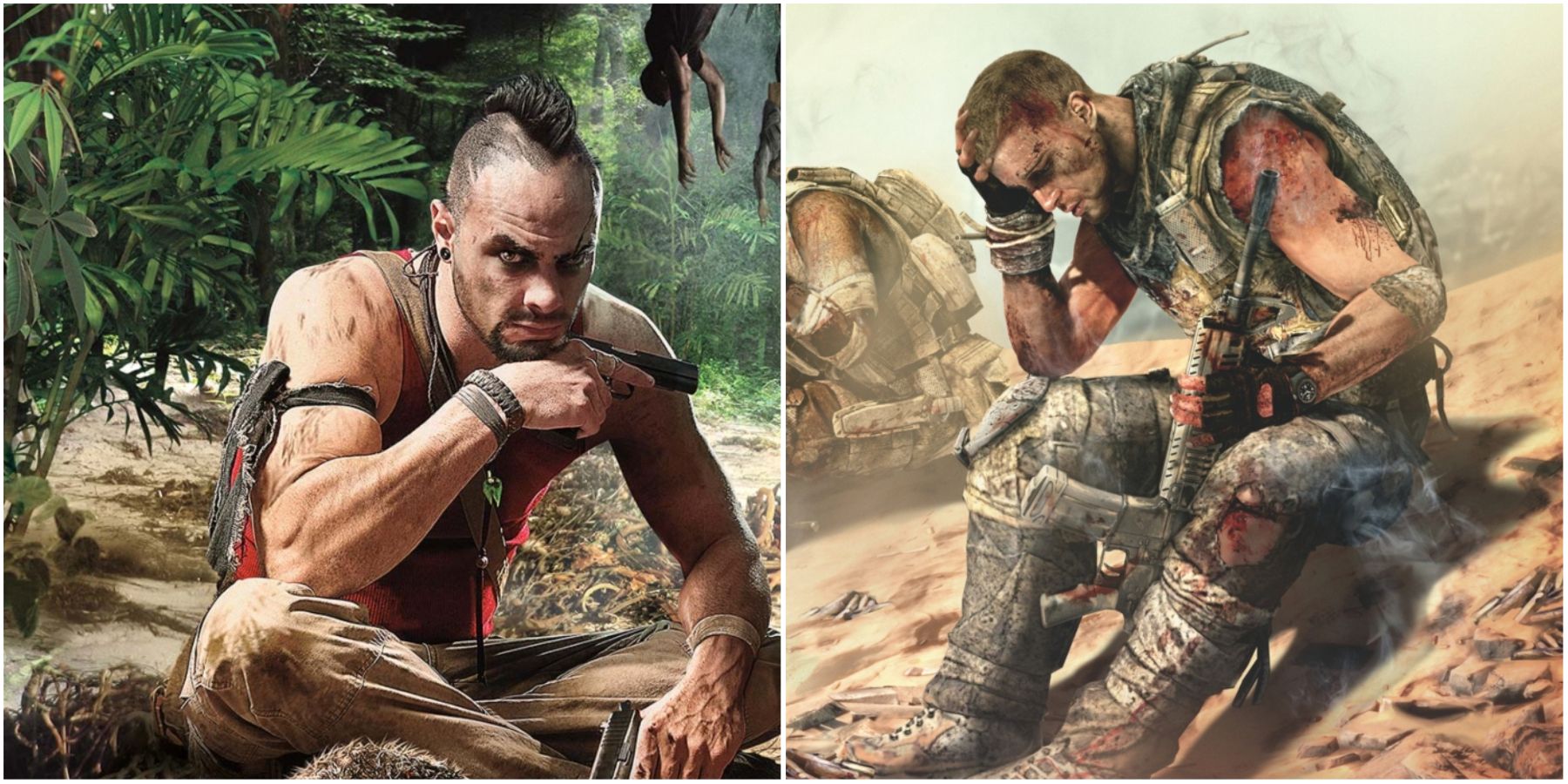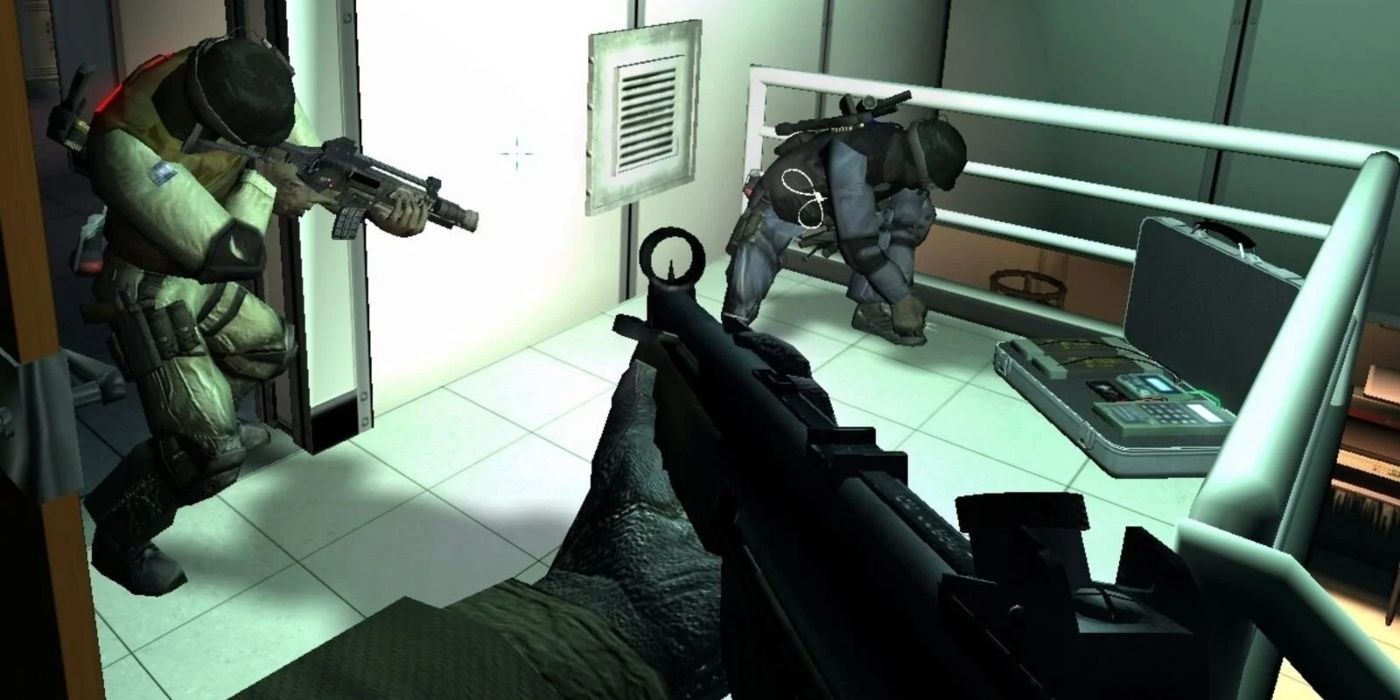Of all the game genres on the market, first-person shooters are always going to be one of the most popular. At this point, when gamers pick up a shooter, they know exactly what they're in for: mowing down waves of bad guys with whatever gun they can find. Most shooters, even the best ones, can easily fall into a predictable formula.
It's surprising, then, when a game breaks the formula when players are least expecting it. Genre deconstruction is at its best when it subverts tropes and expectations, asking questions about why genres are the way they are and why we enjoy that genre in the first place. Games that deconstruct first-person shooters find creative ways in both story and gameplay to critique the genre and the gaming industry as a whole, leaving players a lot to think about and discuss long after they put the controller down.
7 Superhot
This unique indie game may only take a few short hours to beat, but it packs a lot into a tiny experience. Superhot's gameplay is simple; time only moves forward when the player moves. The player is then thrown into various random action-movie scenarios where they have to kill waves of bad guys.
The gameplay itself already begins to deconstruct the nature of first-person shooters. There's absolutely no narrative context for or connection between any of the levels, and enemies are depicted entirely read and featureless. Superhot essentially strips first-person shooters down to their basic mechanics: shoot bad guys. Context doesn't matter, because that's not what players are there for. The narrative of Superhot is known for being extremely meta, exposing the control game designers have over players. Its presentation is so unique, however, that it's best if players experience it themselves.
6 SWAT 4
In most first-person shooters, the objective is obviously to shoot NPCs. Therefore, it's difficult for any shooter to deconstruct the genre without itself becoming a violent shooter. SWAT 4, however, has probably come the closest. Developed by Irrational Games, SWAT 4 is a tactical shooter where players lead a SWAT team through various missions.
Unlike nearly every shooter ever made, going in guns-blazing won't help players win the game. SWAT 4 requires players to act more how an actual member of a SWAT team would act, meaning only using lethal force when necessary. In fact, players who cause unnecessary violence will actually get penalized for doing so. Instead, SWAT 4 rewards players for gathering evidence, making arrests, and generally treating the situation like real life rather than a video game.
5 Far Cry 3
Apart from memorable villains and exotic environments, the Far Cry franchise is known for its explosive playground-style open worlds. As far as intense violent shooters go, the franchise's third installment breaks down the typical formula found in most shooters, examining how gamers enjoy violence. The game's story follows Jason as he and several friends accidentally parachute onto a pirate-infested island. With players controlling Jason, they must kill off the pirates in order to save Jason's friends.
Unlike many first-person shooter protagonists, Jason begins the game opposed to violence, only using it as a means to an end to save his friends. As the game goes on, however, Jason begins to enjoy the violence he inflicts on the pirates, so much so that his friends end up taking a backseat to the gameplay and combat. Many of the game's dream sequences even compare Jason to the game's psychopathic antagonist Vaas, almost arguing that Jason has become more and more like Vaas the more violence he has inflicted. Far Cry 3 exposes how players enjoy combat and violence in games and calls into question why many heavily focus on shooting bad guys.
4 Far Cry 4
While Far Cry 4 may not be quite as meta in its overall campaign as its predecessor, it still offers a fun and clever subversion in its opening minutes if players are patient enough. In the game's opening, protagonist Ajay is traveling to his home country of Kyrat to return his mother's ashes, as per her final wishes. While doing so, the bus he's traveling on is attacked by the Royal Army and the game's main antagonist Pagan Min. Min then takes Ajay and Ajay's tour guide to his mansion; he briefly leaves Ajay alone, which is where the player takes control of Ajay and escapes.
There is, however, a secret ending in the beginning of the game. If players simply wait like they were told, Min will return and thank Ajay for waiting. Ajay will lay his mother's ashes, and the game will end relatively peacefully. Most gamers can't wait to pick up the controller and begin playing, but this secret ending in Far Cry 4 subverts that desire by showing them that Ajay's initial goal could've been achieved if they simply waited. This is obviously the less exciting option, but that's also the point. Peace could've been obtained easily and violence could've been thwarted, but that's not the fun option.
3 Half-Life
At over two decades old, Half-Life still remains one of the strongest first-person shooters ever made. The game's plot has players take control of Gordon Freeman, a scientist working at Black Mesa. When an experiment goes horribly wrong, hostile creatures from an alternate dimension attack the facility, and players must scramble to survive.
While a staple of the first-person shooters today, at the time of its release, Half-Life could be seen as a deconstruction of violent shooters such as Doom. Gordon Freeman isn't a well-trained soldier but a normal scientist simply trying to survive. Whereas games like Doom depict shooting up demons as fun, Half-Life depicts the situation as being something utterly terrifying, with the horror elements getting expanded upon in the game's sequels and spinoffs.
2 Spec Ops: The Line
Arguably one of the most analyzed games on the market, Spec Ops: The Line is still talked about today for its meta-commentary on war video games, despite its commercial failure leading to the end of the franchise. Spec Ops: The Line, loosely based on Heart of Darkness has players play as Captain Martin Walker as he leads a team of soldiers into a war-torn Dubai to find Colonel Joseph Conrad, who disappeared several months prior.
Despite being in third-person, Spec Ops carefully critiques modern war video games such as Battlefield or Call of Duty. The game begins normally but quickly begins to subvert common war game tropes and even break the fourth wall in creative ways, such as making American soldiers enemies or addressing players' love of violence during loading screens. Spec Ops ultimately becomes a careful critique of how gamers seemingly approach war as entertainment rather than a serious issue and dissects how disconnected war games are from real life.
1 BioShock
Few games have packed creative worldbuilding, unique gameplay, and philosophical ideas quite like the original BioShock. While the game is arguably most well-known for its take on the objectivism of Ayn Rand, the game's big twist helps deconstruct the very nature of video games. Near the end of the game, the player character Jack goes to kill the villainous Andrew Ryan, only for him to reveal that Jack has actually been under the control of ally Atlas the entire time.
The nature of the twist obviously calls attention to the fact that players actually have very little control over what they do in video games. Like Jack, it may feel as though players have complete freedom when playing a game. But in reality, everything the player does has been predetermined and designed by the developers far in advance, which is especially true in linear games such as BioShock. Needless to say, after playing BioShock, it's difficult to look at any other game the same way again.


.jpg)

.jpg)
.jpg)
.jpg)
.jpg)
.jpg)